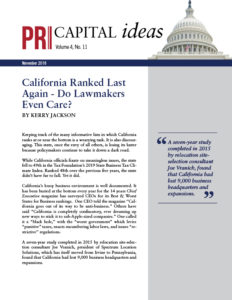Keeping track of the many informative lists in which California ranks at or near the bottom is a wearying task. It is also discouraging. This state, once the envy of all others, is losing its luster because policymakers continue to take it down a dark road.
While California officials fixate on meaningless issues, the state fell to 49th in the Tax Foundation’s 2019 State Business Tax Climate Index. Ranked 48th over the previous five years, the state didn’t have far to fall. Yet it did.
California’s lousy business environment is well documented. It has been buried at the bottom every year for the 14 years Chief Executive magazine has surveyed CEOs for its Best & Worst States for Business rankings. One CEO told the magazine “California goes out of its way to be anti-business.” Others have said “California is completely confiscatory, ever dreaming up new ways to stick it to sub-Apple-sized companies.” One called it a “black hole,” with the “worst government” which levies “punitive” taxes, enacts encumbering labor laws, and issues “restrictive” regulations.
A seven-year study completed in 2015 by relocation site-selection consultant Joe Vranich, president of Spectrum Location Solutions, which has itself moved from Irvine to Pennsylvania, found that California had lost 9,000 business headquarters and expansions.
It’s not just small and mid-size companies departing. There’s also been a stream of Fortune 500 firms pouring out. The list begins, but doesn’t end, with the relocation of Toyota’s North American headquarters from Torrance to Plano, Texas; Nissan North America quitting Glendale for Nashville, where quintessential California burger chain Carl’s Jr. is now based; Jacobs Engineering Group finding Dallas to be a better fit than Pasadena; Nestle packing up at Glendale and landing in Rosslyn, Va.; Northrop Grumman exchanging Los Angeles for Northern Virginia; and Occidental Petroleum making its home now in Houston rather than Westwood.
After San Francisco-based Core-Mark Holding, another Fortune 500 company, announced in August it was moving to Texas, Vranich noted that “legislators couldn’t care less.”
“Don’t expect any of these developments to soften California’s business-hostile environment,” Vranich says. “Last year, one of Gov. Jerry Brown’s representatives met with a group of company owners objecting to new costly regulations. Although he listened a long time, he finally said, ‘Look, we don’t care.’”
To compile its rankings, the Tax Foundation graded states on five separate taxes: corporate, individual income, sales, property, and unemployment. California finished 14th and 17th, respectively, in the last two. It was even ranked 31st in corporate taxes. Where California got into trouble was in the individual income and sales tax categories, ranking 49th in the former, 43rd in the latter.
California’s income tax framework is truly a wreck. State Controller Betty Yee has called it “outdated, unfair, and unreliable.” A survey taken last year by PRI asked 200 executives what policymakers could do that would make the state more a attractive destination for expansion or location. Nearly six in 10 said California needs to comprehensively overhaul its income tax system. One of the executives surveyed objected to the state’s “repressive tax system” while another suggested that rates be cut by half.
It’s not just the tax system harming businesses. California’s regulatory load is poisoning enterprise. Seventy-one percent of executives from the PRI survey said the toxic mixture of regulations and labor laws have factored into their decisions about relocating in California. Another PRI report, the 50-State Small Business Regulation Index, tells us no other state saddles its small businesses with a greater regulatory weight than California.
“These burdens discourage small business growth to the detriment of innovation and robust job growth,” says PRI senior fellow Wayne Winegarden, the study’s author. “While the tailwinds of the current expansion are hiding these costs, they will be felt when the next recession hits and California’s economy crashes harder than the nation — as it always does.”
Vranich once told the Dallas Morning News that in his “view the No. 1 benefit” of leaving California is the freedom to operate in “easier regulatory” environments.
“California’s regulatory regime is so harsh that it causes companies to look at all kinds of states to go to,” he said.
There’s no shortage of voices telling us California is fine just as it is, that its economy is booming and there’s no reason to deviate from the Blue State-Democratic-Socialist governing model.
In reality, though, California is a 500-horsepower economy producing only a portion of that. And it will continue to underperform as long as policymakers smother output with restrictive laws and illiberal regulations.
Kerry Jackson is a fellow with the Center for California Reform at the Pacific Research Institute.
